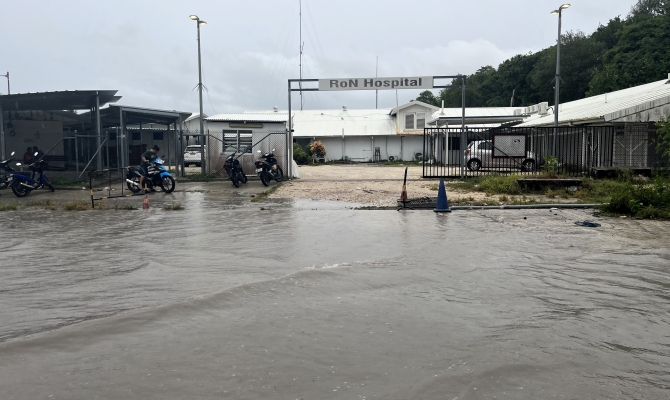
4 July 2024, Nauru – The work to develop a National Adaptation Plan (NAP) for the Pacific island country of Nauru continued today during the second day of discussions with government, private sector, civil society, and community stakeholders in the nation’s capital.
Led by the Monash University team as part of the Nauru National Adaptation Project, the discussions on the second day focused on adaptation options and priorities based on the preliminary results of a Climate Impacts, Vulnerabilities and Risk Assessment which was presented the previous day by a team from the Commonwealth Scientific and Industrial Research Organisation and Deloitte.
The adaptation options and priorities identified and discussed will feed into the development of the NAP, which will replace the existing Republic of Nauru’s Framework for Climate Change Adaptation and Disaster Risk Reduction (RoNAdapt) which was adopted in 2015 with the aim of tackling the country’s vulnerabilities and increase its resilience to the impacts of climate change and disasters.
In setting the scene for the discussions, the Secretariat of the Pacific Regional Environment Programme’s (SPREP) Climate Change Adaptation Adviser, Ms. Filomena Nelson, said, “We want to engage with you and discuss and exchange knowledge on what, if any gaps, you think there may be in the existing RoNAdapt, and what you think should be the strategic focus of the new RoNAdapt.”
The identification and prioritization of adaptation measures that responds to the climate impacts, vulnerability and risk assessment (CIVRA) is one of the key outcomes of the USD 1.8 million Nauru NAP Phase I project, which is funded by the Green Climate Fund (GCF) and implemented by SPREP.
During the discussions, participants were presented with a range of themes that feed into the development and also the implementation of the NAP – from Monitoring and Evaluation, Communications and Engagement, Capacity Building and Stakeholder Engagement.
“Our main aim for today was getting feedback and engagement from the stakeholders and we’re very pleased with the feedback that we received,” said Ms. Genia Hill, Project Development Specialist.
“The break-out discussions gave the participants the chance to discuss amongst themselves and then present to the rest of the participants and to us as well about their priorities which is important for us to source ideas and get buy-in from the stakeholders as this Plan will really be driven by the in-country stakeholders,” she added.
One of the participants, Mr. Lesi Olsson, remarked on the importance of having a plan that is driven by local stakeholders, as they’re the ones who are most knowledgeable about what’s happening in Nauru.
“It’s important to have a Plan that is designed by Nauruans for Nauru, and it’s also important for us to then take that plan and put it into action,” Mr. Olsson said.
“What I’d like to see, and soon, is for this Plan that will be developed from the discussions today to be implemented and progressed without any more delays or stops along the way. I believe that if the the plan is people-driven, then we should be able to avoid delays,” he added.
The Nauru National Adaptation Plan and Readiness workshop is being held in Nauru from 2 – 4 July 2024. It is jointly organized by the Government of Nauru’s Department of Climate Change and National Resilience and SPREP in collaboration with CSIRO, Deloitte, and Monash University.
For more information, please contact Ms. Filomena Nelson, at [email protected].